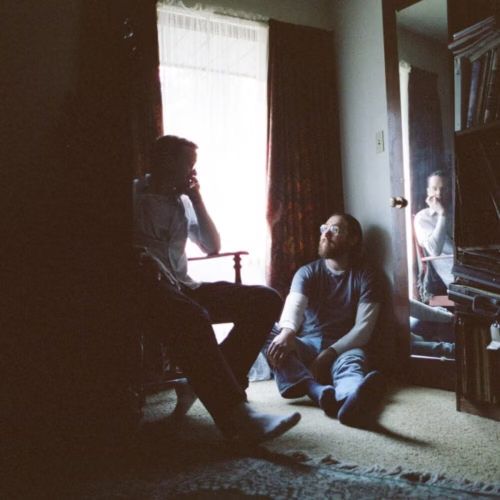Whitney’s fourth album, Small Talk, marks a confident, self-produced leap forward for the Chicago duo. After years of collaborating with outside producers, Julien Ehrlich and Max Kakacek take full creative control, producing a sound that feels natural, spontaneous, and deeply aligned with their strengths. While it’s a compact project with just 11 tracks, its short-and-sweet approach gets the message across and stays light on its feet.
Compared to 2022’s SPARK—a record that flirted with electronic textures but sometimes felt undercooked—Small Talk improves on almost every front. It sounds gorgeous, while still feeling lived-in. Where SPARK polished its edges, this album lets them show.
The songs breathe again, built around melody, space, and rhythm rather than synthetic layers. And that shift makes all the difference: Whitney have rediscovered their best selves.
From the first moments of “Silent Exchange,” their trademarks are intact—warm guitars, crisp drums, and Ehrlich’s falsetto rising through a clean, open mix. There’s clarity and focus here, but also an ease that projects confidence without rigidity. “Dandelions” embodies that balance perfectly. Its breezy rhythm and brass flourishes carry a sense of calm optimism, while the closing trumpet bursts add a gentle lift. It’s one of those songs that slowly nestles itself into your head, effortless and bright.
“Damage” is another highlight—a piano-driven gem whose refrain faintly echoes the Cheers theme song. It’s a strangely fitting touch for an album centered on comfort and reflection. It also evokes nostalgia without slipping into sentimentalism, a balance that gives Small Talk much of its charm. There’s something familiar but never stale about these songs, though, like rediscovering an old record that still sounds fresh.
“Evangeline” is the album’s clear emotional and sonic centerpiece. Featuring Madison Cunningham, it’s bombastic and cinematic, a swirl of strings and drums with two voices intertwining in perfect chaos. It’s the most dramatic Whitney have ever sounded: open-hearted, unguarded, and full of life. Ehrlich’s line, “It’s been too long and I’m too stoned to say it out loud,” captures the messy honesty that runs through the record. It’s a moment of real power, showing just what happens when the band steps outside their comfort zone.
Elsewhere, Small Talk maintains a steady tone, though at times it risks feeling too uniform. The open, airy production is lovely, but a few songs blend together, with gentle tempos and soft textures favoring beauty over distinction. The album excels at mood—breezy, warm, and easygoing—but sacrifices sharper edges. A bit more contrast could have given these melodies greater impact.
Still, there’s no denying the craftsmanship. The guitars are playful and beautifully recorded, while the strings and clarinet add texture without clutter, and Ehrlich’s drumming and vocals are as clean and tuneful as ever. The self-production pays off, giving Small Talk an organic, detailed, and confident sound. The result: Whitney sound like a band fully at home in their own space again.
Closer “Darling” underlines that confidence, shifting mid-song from breakup lament to a bright, wordless release. It’s Whitney at their most assured—leaning into rhythm, letting melody carry the emotion rather than forcing it. The track serves as the perfect ending to an album that’s light on its feet but full of heart.
Small Talk isn’t flawless, but it’s a graceful, sonically rich return for a band that has rediscovered its balance. Now that they’ve proven what they can achieve on their own, the hope is that Whitney will take this production experience and self assurance and push for something even grander next time. For now, the record is a welcome breeze—one we could’ve really used seven months ago to soundtrack the spring.

